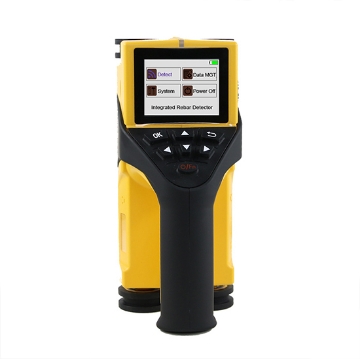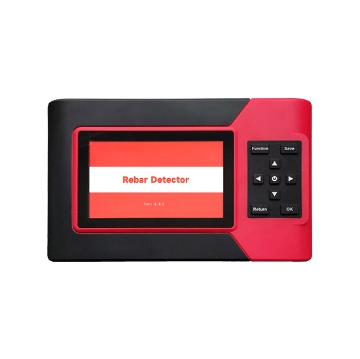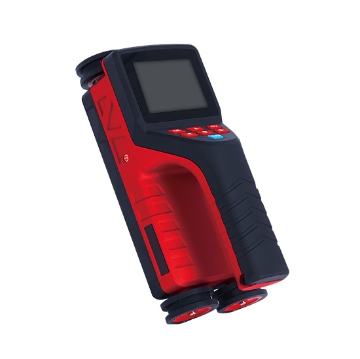Rebar Scanners
Mini Portable Concrete Rebar Scanner
Professional Integrated Concrete Rebar Scanner
Concrete Rebar Scanning Detector
Integrated Rebar Scanner for Concrete
Concrete Rebar Corrosion Detector
Looking for a reliable way to find rebar in concrete? SISCO advanced rebar scanners provide accurate and efficient rebar scanning solutions, helping you quickly locate rebar in concrete with precision. Whether you're conducting a rebar locator test or need professional rebar scanning services, our scanners deliver the performance and reliability you need for safe and efficient construction.
What is a rebar scanner?
A concrete rebar scanner is an advanced device specifically designed for engineering inspection. It is widely used in various fields, including building construction, bridge engineering, tunnel projects, and highway and railway engineering. With cutting-edge technology and precise algorithms, it accurately detects the position, cover thickness, spacing, and rebar diameter within concrete structures. These parameters are crucial for assessing construction quality. By obtaining accurate data, engineers can identify potential quality issues early, ensuring the safety and stability of structures with reliable evidence for engineering decisions.
What are the key advantages and features of the rebar scanner?
- High-Precision Detection: The SISCO rebar scanner utilizes advanced electromagnetic induction technology, enabling it to detect even the smallest variations in rebar within concrete structures with exceptional accuracy. This high precision ensures reliable test results, providing a solid data foundation for engineering quality assessment and helping engineers understand the actual rebar conditions.
- Efficient and User-Friendly: Designed for ease of use, our rebar locator features one-button operation, eliminating complex settings and making it accessible to users of all experience levels. Compared to traditional methods, our rebar detector offers significantly faster detection, improving work efficiency and reducing time and labor costs—a crucial advantage in large-scale projects.
- Large Storage Capacity: Equipped with ample internal storage (varies by model), the SISCO rebar scanner can store vast amounts of scanning data, including rebar parameters. For example, our integrated rebar scanner for concrete has a storage capacity of up to 200,000 rebar points. This allows for easy data analysis and record management, supporting comprehensive quality assessments and future optimization of construction processes.
- Long Battery Life: Our rebar finder comes with a high-performance lithium battery, providing extended operating hours on a single charge. This ensures reliable performance for long-duration outdoor inspections, allowing inspectors to stay focused on the job without interruptions. A long battery life is essential for demanding environments to ensure seamless operations.
- Durable and Rugged Design: Built for harsh working conditions, the scanner’s outer shell is made from high-strength engineering plastic, offering waterproof, dustproof, and shock-resistant properties. Essential for underground tunnel environments, preventing damage from moisture. Protects internal components from dust in construction sites. Ensures stability and accuracy even in environments with slight vibrations, such as bridge inspections.
What are the applications of the rebar scanner?
- Building Construction: The rebar scanner plays a critical role in various stages of construction projects. Before concrete pouring, accurate rebar detection ensures the position and spacing meet design specifications, preventing potential safety hazards caused by improper placement. For example, incorrect rebar positioning can weaken the load-bearing capacity of a structure, compromising its safety. During construction, periodic scanning helps detect any displacement or deformation of rebars, allowing timely corrective measures to maintain project quality.
- Bridge Engineering: Bridges serve as vital transportation links, making their structural integrity a top priority. Regular rebar inspections are essential for detecting corrosion and fractures. Rebar corrosion is a leading cause of bridge deterioration. Early detection enables timely repairs, preventing further damage. Rebar fractures pose a direct risk to bridge stability. Identifying these issues early allows for reinforcement or replacement, ensuring safe passage for pedestrians and vehicles.
- Tunnel Engineering: Rebar scanners are indispensable in tunnel construction and maintenance. In tunnel lining construction, measuring rebar cover thickness is crucial for durability. A proper cover layer prevents rebar corrosion and extends the tunnel's lifespan. Insufficient cover thickness exposes rebar to environmental elements, accelerating deterioration. During tunnel operation, stress monitoring helps detect structural anomalies caused by excessive loads, enabling preventive maintenance to avoid catastrophic failures.
- Highway and Railway Engineering: In road and railway construction, rebar scanners help inspect subgrade, pavement, and track slabs to ensure stability and durability. Detecting rebar ensures roads have sufficient load-bearing capacity, preventing potential failures like pavement collapse. Rebar conditions directly impact train safety. Detecting defects in track slabs prevents structural failures, ensuring smooth and safe travel.






